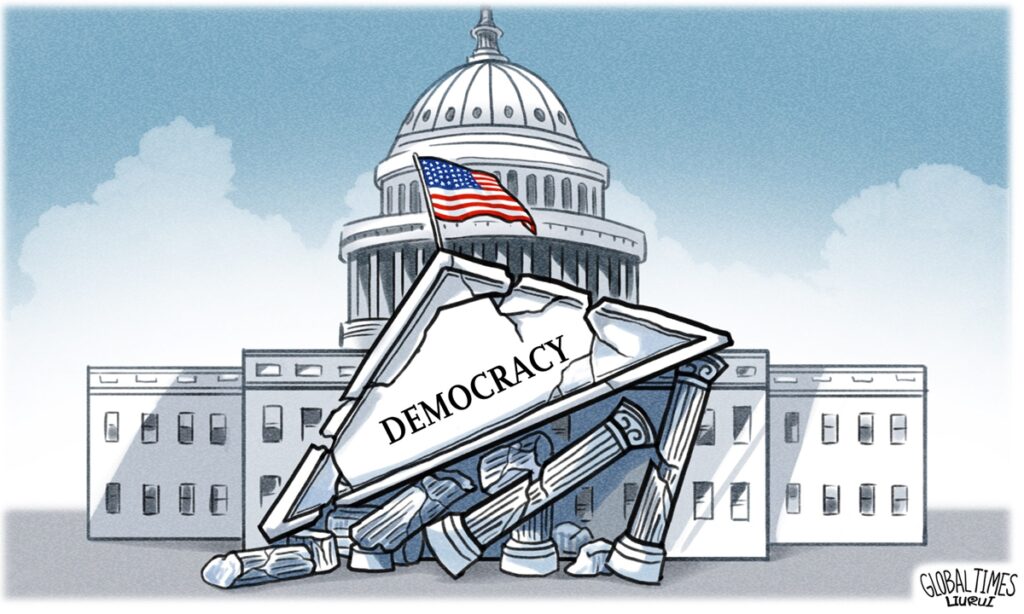In his recent State of the Union address, US President Joe Biden not only praised himself for the achievements of the past two years, but also focused on strengthening the advantages of the so-called democratic system. He asserted that “democracies have become stronger, not weaker,” hyping the confrontation between “democracies” and “autocracies.” But this narrative of “US-style democracy” shows that it is indeed facing a serious crisis, just as the harder the skinner sells, the less reliable the commodities become.
In “US democracy,” there is a stable structure that consists of hegemony, bullying and domineering. Hegemony is the core goal, bullying is the way of action, and domineering is the behavioral characteristic. The three may change in their external manifestations according to the increase and decline of the US’ own strength, but their essence will not change, and it is engraved in “US democracy.” To international observers, this is obvious.
The three words are prominently reflected in the US’ control and monopoly of the right to interpret the connotation of modern democracy. It does not allow a second interpretation. It wants to pull out all the “flowers” that grow naturally in the garden of human political civilization and leave only the single seed of “US democracy.” However, this goes against the general trend of multi-polarization and diversification. The US can only think about it, but not actually do it, making it look distorted and deformed, sometimes hypocritical and sometimes hideous.
Generally speaking, modern democracy can be divided into two levels. In a sovereign country, democracy means that the people are the masters of the country, and people’s affairs are discussed and handled by the people; in international relations, democracy means that every sovereign country is equal, and its will and demands should be respected. Judging from the development of human civilization over thousands of years, all countries are constantly experimenting with the ways for people to participate in public life, including political life, and finally gradually explore a political path suited to their own national conditions. The whole process presents a trend of diversification, and there has never been one “democratic system” that fits all.
In the name of “democracy,” the US makes a distinction between friends and foes, and engages in a Cold War mentality in the global village. This is US-style democratic hegemony. In terms of international relations, the US actually pays more attention to so-called order and hierarchy. Once such a hierarchical concept is involved, there will be no real democracy. The US regards itself as a leader, and through long-arm jurisdiction, it abuses domestic laws and implements them in the international community, oppresses other countries at will, and seeks only its self-interest. These ideas and practices are anti-democratic.
In 2022 alone, the US carried out 100 sanctions against others, involving 82 countries and regions. The number of entities on the US Treasury Department’s Office of Foreign Assets Control (OFAC) sanctions list has increased from 912 in 2000 to 9,421 in October 2021, a net increase of 933 percent.
Over the years, there have been countless anti-democracy cases in the US. “Democracy” has long been a tool with which the US has pursued global hegemony. When Washington needs to suppress opponents, democracy is a weapon; when it needs to win over partners, democracy is a foundation. The anti-democratic “tyrant” talks about “democracy,” which is an insult to democracy. The hegemonic, bullying and domineering nature of US democracy is experiencing unprecedented internal and external shocks. From the Capitol Hill riots in 2021 to the once-in-a-century political chaos this year, “US democracy” has begun to show cracks from within. The successful democratic practices of other countries are seen as a formidable enemy by the American political elite, who are accustomed to self-importance.
When a system is in crisis, its aggressiveness will become stronger, and the hegemonic, bullying and domineering nature of US democracy will intensify. But from the perspective of common sense, this abnormal state is unsustainable. “US democracy,” which has long been used as a weapon that is fired everywhere, has increasingly drawn the vigilance of the world. Either US democracy actively adjusts itself to adapt to the development of the times, or it will be passively left behind by the tide of the times. For US democracy today, these are the only two options on the table. This is what President Biden should be bothered about.
(Global Times)




